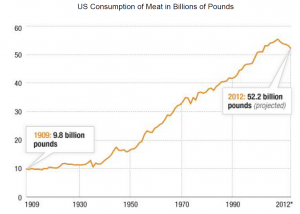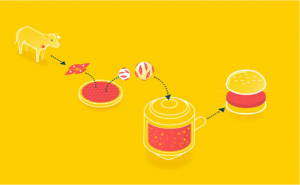Picture this: the year is 2050, population has soared to almost 10 billion people… and they all want to eat meat. Currently, in the United States alone, there is approximately 1 one cow and seven chickens for every three people.2 The global population as of now is right around 7.3 billion people, but rising quickly. In a world where food shortages are already a common occurrence and farmers are running out of land for crops, how will humanity adapt to these thwarting conditions?3

Since the mid-twentieth century, worldwide meat consumption has greatly increased. Assuming that this trend in consumption will not change, it is important to start considering new options to replace meat. Although tofu has become a viable alternative for many vegans and vegetarians, for others, it can be a somewhat “acquired taste.” Scientists, taking this into consideration, have begun developing an alternative to the cattle industry: cultured meat.
The process begins by growing individual muscle cells that then connect and grow into tissue. Once enough of these cells are aggregated, other hamburger ingredients like egg, onion, and bread crumbs are added for taste. This remarkable development seems like an obvious solution to the world hunger crises—meat we can grow ourselves! For all the steak lovers out there, researchers are still trying to grow longer muscle cells that are required to form steaks, but as of now only hamburger meat is possible. Although, considering the progress made in the last decade, nothing is impossible!
The process of growing cells, however, is a controversial science. In order to grow the cells, scientists must use fetal bovine serum. This serum is collected from fetal calves and remains an unsustainable source of nourishment for the cells. Yet, in recent years, the same hamburger meat has been created without FBS.

The danger with FBS—disregarding its controversial nature—is the potential harm it could effect on consumers. For example, a diseased calf has the possibility to transfer the bacteria and illness to humans. This type of chain reaction is exactly what caused the beloved Mexican restaurant franchise, Chipotle, to shut down in 2016 due to an e. coli outbreak.4
Of course, the potential benefits are difficult to understate. Less cows mean less methane, a greenhouse gas, and less of the world’s agricultural space devoted to livestock feed. Reducing the number of cows would lead to more humane treatment of animals, giving us
healthier options such as grass-fed beef.
The decision that we have to make involves evaluating the risk and reward associated with this process. Is it worth advancing the research for cultured meat? I think that our answer should be yes. Otherwise, any hopes of accommodating the wants and needs of the world is impossible. Taking into account our future population and the demands that come with it, it is imperative to break from the status quo and begin a new era of innovation and creativity. Some may say this is easier said than done, but I believe that humanity has a good track record of adapting to stress. The only factor is whether we do it sooner or later.
-Sonia Clemens
1 http://www.un.org/en/development/desa/news/population/2015-report.html
2 https://www.economist.com/blogs/dailychart/2011/07/global-livestock-counts
3 https://www.npr.org/sections/thesalt/2012/06/27/155527365/visualizing-a-nation-of-meat-eaters
4 http://money.cnn.com/2016/01/15/news/companies/chipotle-food-safety-meeting/index.html